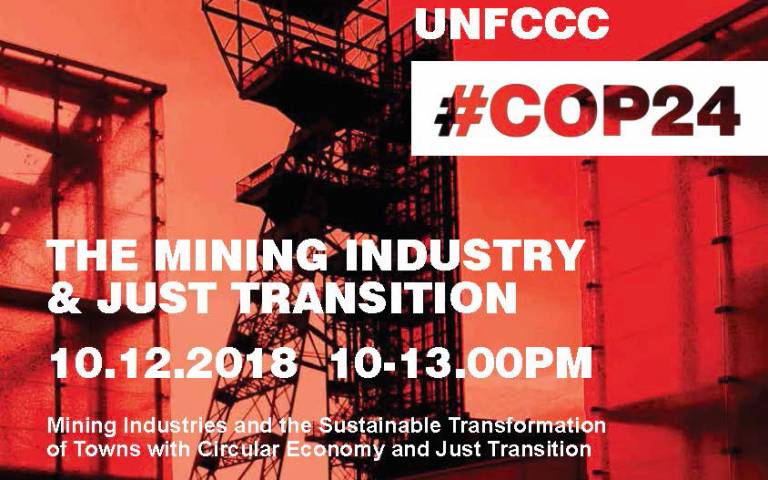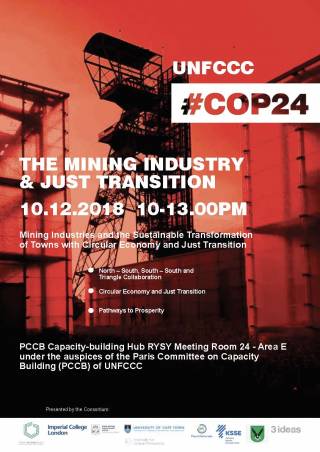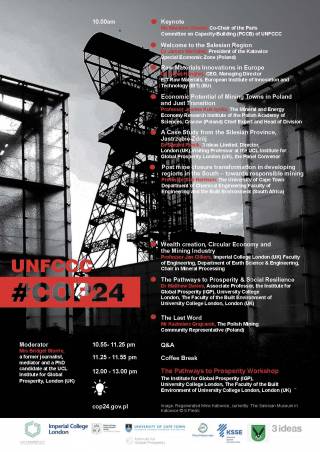IGP @ UNFCCC #COP24: The Mining Industry and Just Transition
10 December 2018, 10:00 am–1:00 pm

Colleagues from the Institute for Global Prosperity will present at the event 'The Mining Industry and Just Transition: Mining Industries and the Sustainable Transformation of Towns with Circular Economy and Just Transition', at the Katowice Climate Change Conference (UNFCCC COP 24)
Event Information
Open to
- Invitation Only
Organiser
-
Dr Sandra Piesik
Location
-
PCCB Capacity-building HubArea EKatowiceNA
On Monday 10th December 2018, colleagues from the Institute for Global Prosperity Professor Henrietta Moore (Founder and Director), Dr Sandra Piesik (Visiting Professor), Dr Matthew Davies (Associate Professor) and Mrs Bridget Storrie (PhD candidate) will take part in the side event, 'Mining the Future: Mining Industries and the Sustainable Transformation of Towns with Circular Economy and Just Transition', at the COP 24 UNFCCC Katowice Climate Change Conference 2018. Organised by a multidisciplinary research consortium, this event will introduce a new project exploring the sustainable transformation of mining towns.
About
The role of mining in over 180 national economies worldwide has a substantial impact on the global economy. Many of these national economies are in low- and middle-income countries. Numerous industrial sectors increasingly depend on supply of commodities from underground for metals and minerals. However, their use and the traditional extraction processes affect the environment and people living in the concerned areas.
The mining of minerals and metals is likely to become technologically more efficient as part of a shift to a more circular economy. In addition, the imperative to reduce reliance on fossil fuels means that certain minerals, such as coal, will become increasingly redundant. While this may contribute to more ecologically sustainable development, people living in mine-affected communities will be vulnerable to lost employment opportunities and the risk of finding themselves in post-mining ghost towns.
New, collaborative, multi-stakeholder ways of thinking about mining, mine closure and post-mining futures are required to support the just transition of mining towns and the wellbeing of the people who live in them. This means exploring alternative pathways to prosperity and developing social resilience in the face of environmental, economic and social change.
This project aims to explore the Just Transition of mining communities to low carbon economies. Mining towns face a diverse range of challenges ranging from setting up mining operations, creating neighbourhoods for the mining community, enjoying periods of prosperity, closing of the mines, to facilitating new jobs for the local community afterwards.
The consortium consists of an international team of experts representing: the Institute for Global Prosperity, Imperial College London, The Mineral and Energy Economy Research Institute of the Polish Academy of Science (Cracow, Poland), The University of Cape Town (South Africa), 3 Ideas Ltd (London), EIT Raw Materials (EU) and the Katowice Special Economic Zone (Katowice, Poland), are working with input from local community, UN Representatives from The Paris Committee on Capacity-building (PCCB) and the mining industry. Initial studies will be conducted in mining-affected communities in Poland in the Katowice Special Economic Zone (KSSE), South Africa and Zambia.
Objectives
The objective of the project to be presented durng this session is to explore opportunities behind the sustainable transformation of mining cities. Best practice, scalable solutions that could be implemented locally as well as globally whilst fostering North-South collaboration will be described.
1. North - South, South - South and Triangle Collaboration
The UNFCCC Convention, the Paris Agreement and the Agenda 2030 for Sustainable Development call for North-South collaboration. It is proposed to carry out an initial socioeconomic and spatial mapping exercise of the urban transformation of cities, in Poland (Jastrzębie Zdrój in the Katowice Special Economic Zone, the Salesian Province) and in South Africa and Zambia. This will help to formulate an understanding of complex processes, in order to see how this transformation is currently taking place and how it may be aided by other sustainable solutions for selected cities.
2. Circular Economy and Just Transition
A holistic concept of the principles of circular economy will be explored with the best options for the long-term socioeconomic transformation needed in mining cities. It is hoped that in a later stage of the project some of these recommendations will be implemeneted in the participating cities.
3. The Pathways to Prosperity and Social Resilience
The resilience of local people will be also studied to understand social aspects of Just Transition and depict important factors of community resilience including local culture.
A multidisciplinary team of some of the world's leading scientists will bring their research and development expertise to offer the best practice solutions. These will be combined with inputs from the local communities, cities and the United Nations representatives.
Dr Sandra Piesik, the consortium co-founder says: 'This is true north-south collaboration, and we are excited to be working together at what we believe is a critical time for exploring what 'just transition' means to people who live and work in mining communities around the world.'


 Close
Close

